
ASEAN to play a central role in U.S.-ROK-ASEAN Cooperation
Latest
| TIN LIÊN QUAN | |
| Officials talk priorities for ASEAN in 2018 | |
| ASEAN is in good shape and on an upward trajectory | |
Prospects for U.S.-ROK-ASEAN Cooperation
ASEAN strives to promote cooperation in Southeast Asia and develop ties between the region and other countries. The organization attaches great importance to its relations with the United States and South Korea. Although there have been times when U.S. cooperation with ASEAN appears to waver, ASEAN has always responded by promoting a more active role by the United States. For its part, the United States has increased participation in regional cooperation forums over the past decade, notably the EAS, ARF, and U.S.-ASEAN summit, although the trajectory remains uncertain under the Trump administration.
The Trump administration’s policy planning and implementation, particularly in relation to Southeast Asia, will have direct consequences for U.S. cooperation with South Korea and ASEAN in promoting Asian regionalism. While still the world’s leader in soft and hard power, the United States continues to face many challenges, including continued growing geopolitical instability in the international political and security environment; competition from emerging countries, especially from China and partly from Russia; and difficulties in its domestic politics, combined with limited resources, which constrain policy options and priorities for the United States.
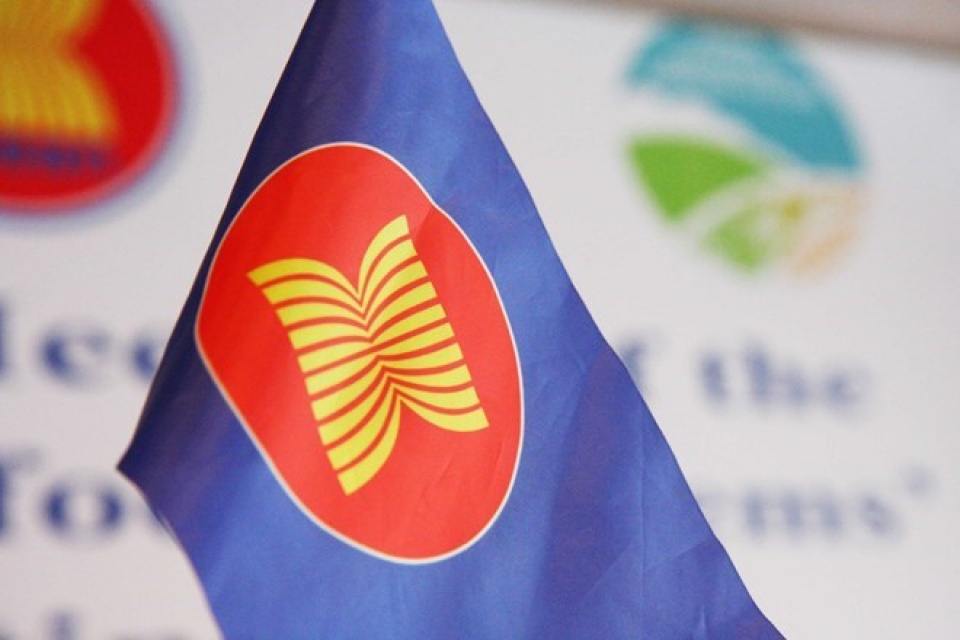 |
| Illustrative image. (Photo: ASEAN SAS) |
In addition, the United States also has to address complex traditional and non-traditional security challenges that lack simple solutions. Notably, Asian nations (including South Korea and ASEAN countries) are interested in how the Trump administration will address Chinese efforts to rewrite the regional rules. There are also concerns that cooperation between the United States and China could sacrifice the interests of other Asian countries or that tensions between the United States and China could lead to regional instability or even military conflict.
The Future of U.S.-ROK-ASEAN Cooperation
The prospects for cooperation on regionalism among the United States, ASEAN, and South Korea are set in the context of Asia’s continued economic growth. Efforts to strengthen regional cooperation and promote economic and strategic stability will continue. However, the region faces a number of nontraditional security issues and growing tensions on the Korean Peninsula without a clear resolution in sight.
Nevertheless, in the absence of an alternative regional security mechanism, ASEAN will continue to play a central role, and this will likely be a longstanding trend in Southeast Asia. At the fiftieth ASEAN Ministerial Meeting, all countries affirmed the importance of ASEAN to the peace, stability, and development of the region as well as of each ASEAN member. ASEAN should continue to promote solidarity and lead regional cooperation mechanisms to enlist the support of partners in building the ASEAN Community and expanding its external relations. Southeast Asian countries agree that ASEAN is a bright spot in economic cooperation and should champion free and fair trade through the effective implementation of existing free trade agreements and the negotiation of new multilateral agreements, including the Regional Comprehensive Economic Partnership (RCEP).
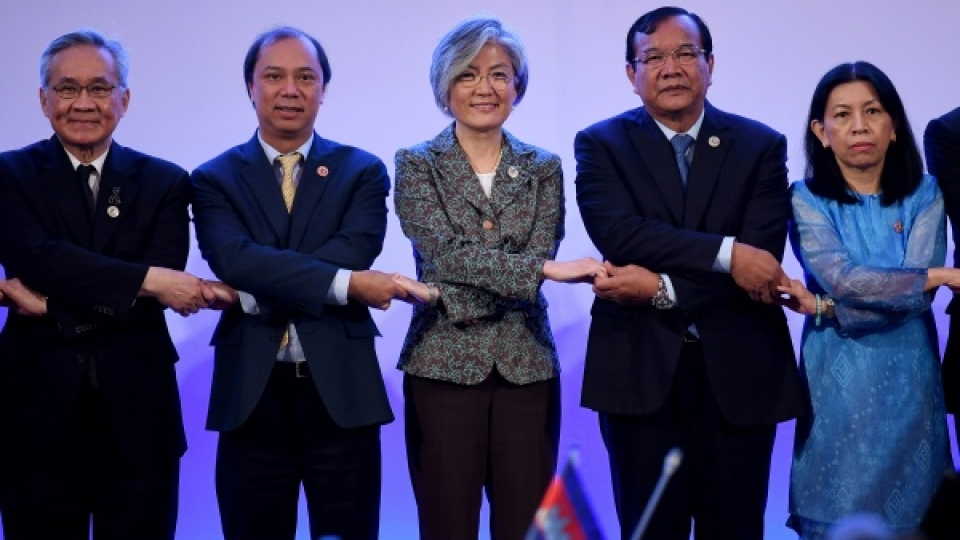 |
| South Korean Foreign Minister Kang Kyung-wha (centre) links hands with ASEAN foreign ministers and their representatives at the ASEAN-Republic of Korea Ministerial Meeting in Pasay city, Metro Manila, the Philippines, on August 6, 2017. (Photo: Reuters) |
There is a widely accepted perception among ASEAN countries that the United States, South Korea, and other like-minded countries, such as Japan and Australia, aim to strengthen Southeast Asia’s multilateral institutions. Therefore, the United States, South Korea, and ASEAN will likely continue to promote cooperation in ASEAN-centered regional groupings, including the ASEAN+3, EAS (an important regional institution in which the United States participated in 2010), and the EAMF, which was established in 2012 to address maritime security issues. The ARF, established in 1994, currently includes twenty-seven participating countries and will remain important. In the field of defense cooperation, the ADMM Plus (established in 2010) presents opportunities for parties to address security challenges. The United States has also expressed support for the establishment of the RCEP among ASEAN and six partners including China and South Korea.
The rise of China, in particular, is an important factor influencing the form of regionalism and U.S.-ROK-ASEAN cooperation in Asia. China seeks to promote alternative rules of the game, affecting prospects for peace and stability in the South and East China Seas. In 2010, China overtook Japan to become the world’s second-largest economy and has been increasing its military spending and employing hard and soft power simultaneously to increase its influence in the region.
Based on its claim of the so-called nine-dash line, which lays claims to over 80 percent of the South China Sea area, China has been carving out its sphere of influence, altering the status quo, and creating tension in the region. Speaking at the Shangri-La Dialogue in Singapore on May 29, 2015, Singaporean Prime Minister Lee Hsien Loong said that, as the strategic configuration in Asia changes, relations between the United States and China are vital to shaping China’s peaceful rise. Therefore, other Asian countries want this bilateral relationship to remain stable. He also emphasized the importance of freedom of navigation for important sea-lanes through the South China Sea and warned that ongoing tensions in both the East and South China Seas could destabilize the region.
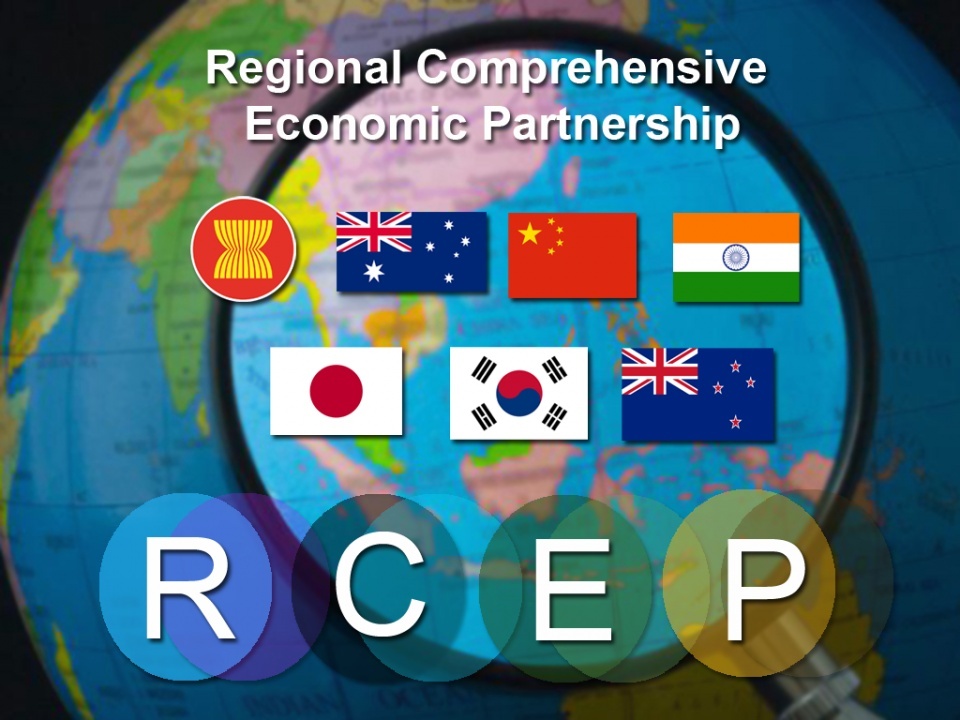 |
| Illustrative image. (Photo: ASEAN.org) |
The United States and South Korea will likely continue to gradually promote cooperation in addressing the South China Sea issue, with the United States enhancing its military presence in the region and encouraging other nations to develop a code of conduct between China and ASEAN. This is also a continuation of ASEAN leaders’ goals for disputes to be resolved peacefully and for freedom of navigation to be protected, and it is consistent with the commitment between President Obama and ASEAN in February 2016 to uphold “non-militarization and self-restraint in the conduct of activities.” President Trump will likely continue supporting that course of action.
Cooperation on the South China Sea also illustrates that South Korea is paying more attention to regional security issues than it had before. Security dialogues between South Korea and ASEAN have been held regularly since 2014 and can more directly address the issue of military cooperation than the security forum between Japan and ASEAN focusing on nontraditional security issues. In view of the limited security cooperation between China and ASEAN, this cooperation between South Korea and ASEAN countries is promising.
Promoting regional mechanisms and issues related to the South China Sea are not the only areas where the United States, South Korea, and ASEAN can continue to work together. The three powers can also promote more cooperation on the Korean Peninsula, with ASEAN playing an intermediary role. In addition, South Korea could become more involved in cultural cooperation between the United States and ASEAN as well as technical and humanitarian assistance such as the Lower Mekong Initiative (LMI) that aims to connect Cambodia, Laos, Myanmar, Thailand, and Vietnam’s efforts to solve problems facing the Mekong River region. ASEAN is the seventh-largest market in the world and is the fourth-largest export market for the United States; it, therefore, deserves more attention and cooperation from the United States and South Korea.
| Binh Thai Lai is the deputy consul-general of Vietnam in Houston, Texas. Prior to his current position, Lai served as deputy director-general and assistant director-general in the Vietnamese ministry of foreign affairs, director of the American research division, director and deputy director of the North America division, and as a Vietnam-U.S. relations desk officer. Lai has participated in various research projects on U.S.-Vietnam relations, including the book Vietnam-Americas: Challenges and Opportunities, and he coauthored the book U.S.-China relations: Cooperation and Competition From the Perspective of Balance of Power. |
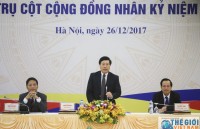 | Government bodies discuss ASEAN cooperation A conference on Vietnam’s performance across three pillars of the ASEAN Community took place in Ha Noi on December 26, gathering 100 representatives from ministries ... |
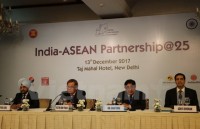 | India promotes relations with ASEAN Vietnamese Ambassador to India Ton Sinh Thanh has highlighted the strong development of the relations between ASEAN and India over the past 25 years in ... |
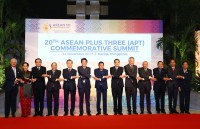 | ASEAN, China to make East Sea region more peaceful, stable At the just-concluded 31st ASEAN Summit in the Philippines, leaders of the ASEAN countries and China agreed to start negotiations to finalize the Code of ... |















